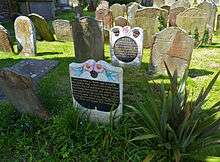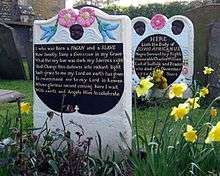Scipio Africanus (slave)
Scipio Africanus (1702 – 21 December 1720) was a slave born to unknown parents from West Africa. He was named after Publius Cornelius Scipio Africanus Major, the third century BCE Roman general, famous for defeating the Carthaginian military leader Hannibal.
Life
Very little is known of his life. He was the servant of Charles William Howard, 7th Earl of Suffolk, who in 1715 married Arabella Morse and lived in the "Great House" in Henbury, Bristol. It is not known how he was acquired, but he died there aged, according to his headstone, eighteen. His master and mistress would die two years later.[1]
Grave
He is remembered because of the elaborate grave, consisting of painted headstone and footstone, in the churchyard of St Mary's in Henbury. The grave is grade II* listed.[2] Both stones feature black cherubs and the footstone bears the unusual epitaph:
- I who was Born a PAGAN and a SLAVE
- Now sweetly sleep a CHRISTIAN in my Grave
- What tho' my hue was dark my SAVIOR'S sight
- Shall Change this darkness into radiant Light
- Such grace to me my Lord on earth has given
- To recommend me to my Lord in heaven
- Whose glorious second coming here I wait
- With saints and Angels him to celebrate

It is thought that 10,000 black slaves and servants were in Britain in the early 18th century, but this is one of the very few memorials to them. Curiously, there is no record of his burial in the church registers.[3]
Cultural references
The author Eugene Byrne featured Scipio Africanus in his 2001 alternate history novel Things Unborn. In this novel people who had suffered an untimely death were reincarnated in an England recovering from a nuclear war; Scipio Africanus was a famous war hero and a Detective Inspector in the Metropolitan Police.[4]
The Bristol-based reggae band Black Roots wrote a song about Scipio Africanus which they performed live at Trinity Hall, Bristol on Channel 4's 10 part series 'Rockers Roadshow' produced by Mike Wallington and hosted by Mikey Dread in the 1980s. They featured a short cut scene of the grave.[5]
See also
Sources
- Macquiban, Tim (2004). "Africanus, Scipio". Oxford Dictionary of National Biography Online. Oxford University Press. Retrieved 1 August 2013. (Subscription required (help)).
References
- ↑ Macquiban
- ↑ Historic England. "Memorial to Scipio Africanus 10 metres north west of south porch of Church of St Mary (1205137)". National Heritage List for England. Retrieved 24 September 2016.
- ↑ "The 18th century: church records". Discovering Bristol. Retrieved 1 August 2013.
- ↑ Silver, Steven H. "Things Unborn". Steven Silver. Retrieved 24 October 2015.
- ↑ "Black Roots". All Tomorrow's Parties. Retrieved 24 October 2015.
